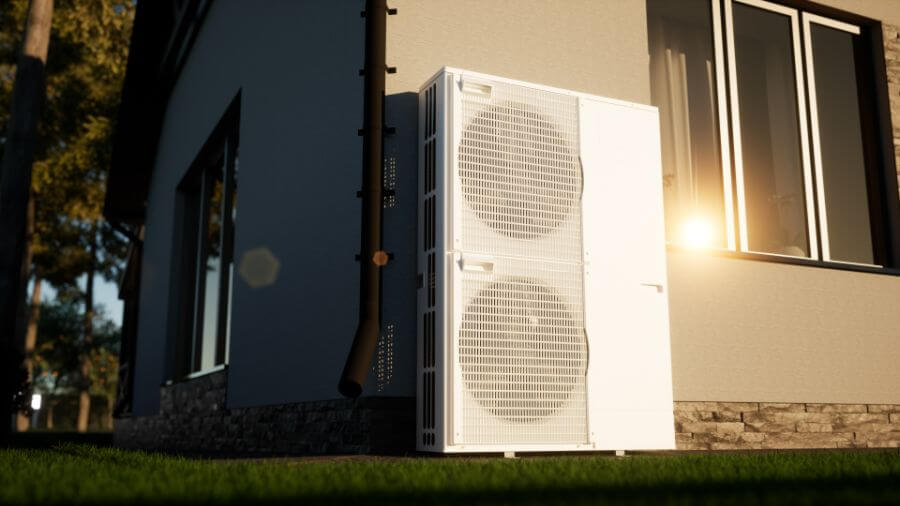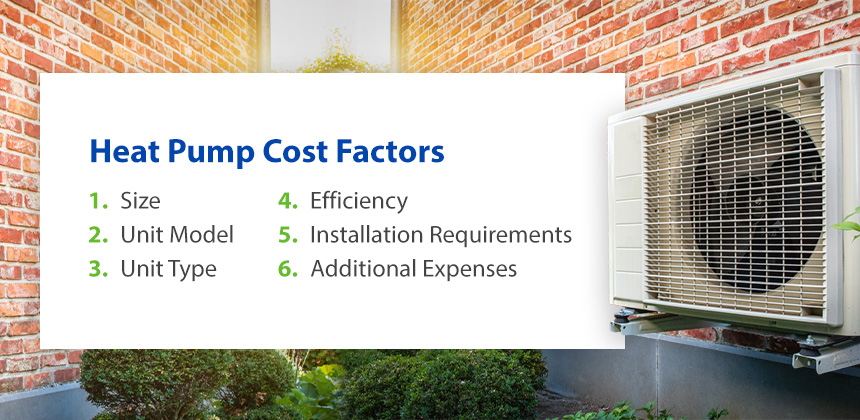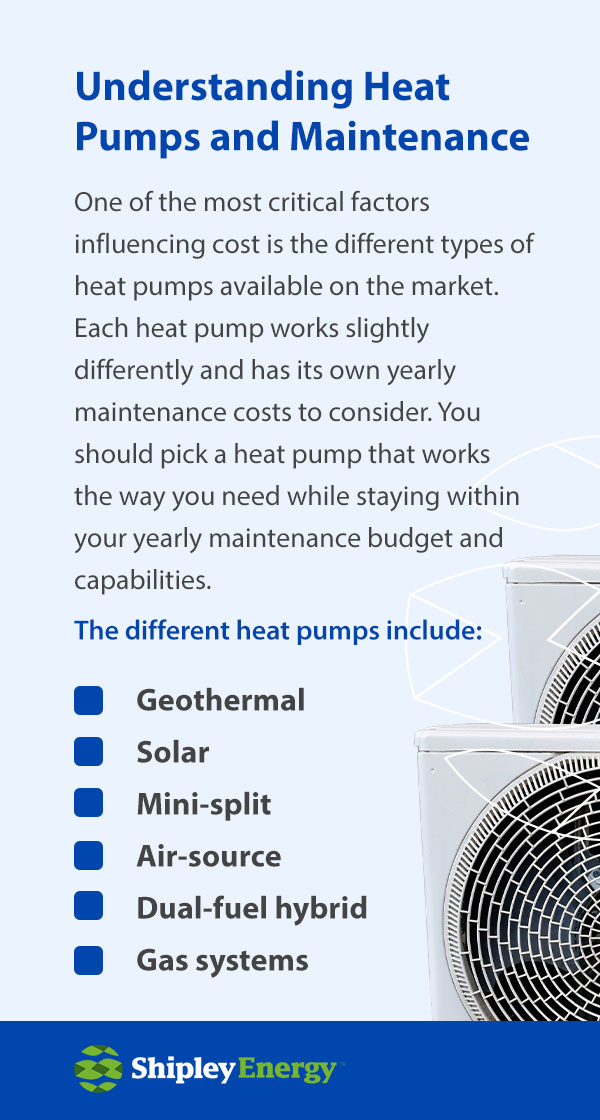
Heat pumps are a comfortable way to cool and heat your home, keeping your family safe from extreme temperatures in summer and winter. While a heat pump is a great way to make your home more comfortable, you may wonder how much it costs to install and operate one.
Many costs factor into the overall price of a new heat pump, such as the model, size of your home, installation, labor, and maintenance costs. Below, you’ll learn more about heat pump pricing and how to find the right one for your home.
The cost of heat pumps ranges widely depending on various factors, such as:
A heat pump must be sized correctly to heat and cool a home efficiently. The wrong size can lead to additional energy costs since a smaller unit will need to work harder to provide heating and cooling to the home.
If you own a large house, you will need a larger unit and vice versa. While larger heat pumps cost more, they will run more efficiently than installing a smaller unit that will raise your energy costs. Maintenance on smaller units may cost less money and time, since there’s not as much unit space to maintain.

Heat pump costs vary depending on the brand and efficiency level. When you choose a heat pump, you’ll want to compare the Seasonal Energy Efficiency Ratio (SEER), which indicates the heat pump’s useful life and efficiency level. Choosing a heat pump with a higher SEER rating may cost more initially, but some of this cost will be offset by the energy savings generated by a more efficient system.
Different heat pumps have various methods of generating hot and cool air, either from the air, soil, or water. Some heat pumps can also run on solar energy.
The type of heat pump you choose and its method to warm or cool your home will factor into the cost. More intensive installations, fuel type, and unit construction are some factors that will affect your unit’s price. Each type of heat pump will have a different price based on its features.
Your home’s location will influence how efficient your heat pump will be at cooling or heating your home. Heat pumps are usually most efficient in warmer areas where the unit’s refrigerant lines will have plenty of heat to draw from. While heat pumps can become less efficient as it gets colder, these units can be supplemented by gas or electric furnaces.
Efficiency will play a role in cost since more efficient heat pumps will help reduce energy costs. You should consider purchasing a heat pump if you live in a warm area since it’s one of the most cost-effective ways to cool or heat your home.
A heat pump installation will have additional costs, typically for equipment, materials, and labor. The excavation and the labor can be one of the more significant costs of a heat pump installation. The more labor-intensive your installation, the more expensive your installation may be.
When investing in a new heat pump, you’ll want to factor in more than just the cost of the unit itself. Consider the installation requirements so you can get a better understanding of the total cost.
Besides the price of the unit and the labor costs, there may be a few other costs to consider. For example, you may have to obtain a permit, which can incur some fees. You may also need to consider electrical work if you don’t have the existing electrical infrastructure in your home.
You’ll also need to consider the long-term operational costs of owning a heat pump. Have the unit serviced annually and account for any repairs you may need throughout its life span. If you keep up with your maintenance routine, you generally won’t have to worry about any unexpected or costly repairs. You’ll also be maintaining the efficiency of your heat pump, which will further reduce costs.

One of the most critical factors influencing cost is the different types of heat pumps available on the market. Each heat pump works slightly differently and has its own yearly maintenance costs to consider. You should pick a heat pump that works the way you need while staying within your yearly maintenance budget and capabilities. The different heat pumps and their general maintenance include:
Since there are different heat pump systems, it can be hard to determine an average price. The cost will depend on your home’s size and comfort needs. You may choose a mini-split system, which is more affordable than other types of heat pumps, or you may decide to opt for solar-powered heat pumps if you’re already considering installing solar panels for your home.
While some heat pumps have higher initial investment costs, these costs are often offset by the savings you’ll generate by reducing your energy bills. You may also find local incentives or rebates in your area to further offset the cost of a new heat pump system. If you work with a professional provider, they can help you determine which incentives you’re eligible for on the federal, state, and local levels to help you find a heat pump system that fits your budget.
When choosing a heat pump, do plenty of research and evaluate your options. Consider your home’s size and what you need from a heating and cooling system. If you have a larger home, investing in a larger heat pump system is best since you don’t want your unit to work too hard, shortening the life span of your investment. If you’re unsure what heat pump system is best for your home, talk with a local provider to get the best idea of the system that will help improve your comfort at home without exceeding your budget.
Hiring a professional to install a heat pump is the best way to ensure your installation is successful and safe. With professional installations, you’re paying for the quality and experience of the professional. Simple heat pump installations can take three to four hours, while more complex systems may take an entire day or longer, increasing installation costs.
While DIYing your heat pump installation can result in significant savings, you should always rely on a professional to install your unit. Even if you’re experienced in DIY projects, heat pumps are a considerable installation that most people aren’t set up for.
Depending on the type of heat pump you need, you may need excavation to bury the refrigerant lines. If you attempt to perform the excavation yourself and something goes wrong, you won’t have a warranty on the work like you could with a professional installer. You would have to contact someone to remedy the problem, requiring additional out-of-pocket costs. Other types of heat pumps, such as ones that use dual-fuel gas lines, will need to be connected by a licensed professional to ensure there are no gas leaks, which can be a hazard.
Hiring a licensed and experienced installer has many benefits, including:
While the labor costs are an additional factor to budget for, a professional can ensure the installation is done correctly the first time and under warranty, which will help reduce unexpected repair costs. Your installer can also help you determine the most efficient use of your heat pump to ensure you get the best investment return.
After determining what type of heat pump, you want and how much installation will cost, there are other factors to consider determining how much it will cost to own your new heat pump.
Protecting your investment with regular maintenance and service extends the life span of your unit and keeps it performing throughout the year. Regular maintenance has some costs to consider, depending on what you need to be done. You’ll also need to consider labor costs for the maintenance or repairs. Your installer may offer service packages or discounts if you purchased a heat pump through them.
While maintenance can be an additional cost, you can get a return on your investment by properly maintaining your heat pump. Extending the life span of your heat pump ensures you get the most for your money. Heat pumps can also reduce energy costs, resulting in more savings, especially if you maintain the proper maintenance schedule. If you ever decide to sell your home after installing your heat pump, you can also generate a return since it can potentially increase your property value, as homebuyers won’t have to worry about installing one of their own.
Purchasing and installing a heat pump is an investment, but following maintenance schedules and saving on energy costs can help you see a return on your investment, helping offset the unit’s overall cost.

Now that you know about the different factors that influence the cost of a heat pump, you can decide the best unit to purchase for your home. Consider the size of your home, the type of heat pump you want, the installation cost, and the total cost of ownership. While a heat pump is an investment, it will pay for itself with the comfort it provides your family and the energy savings it generates.
Shipley Energy is a certified heat pump installer that can help you find the best heat pump for your home. We also offer repairs and maintenance services to maintain your heat pump’s efficiency and keep it working at peak efficiency for years to come. Contact us today to learn how we can help you improve your home comfort in a way that fits your budget!